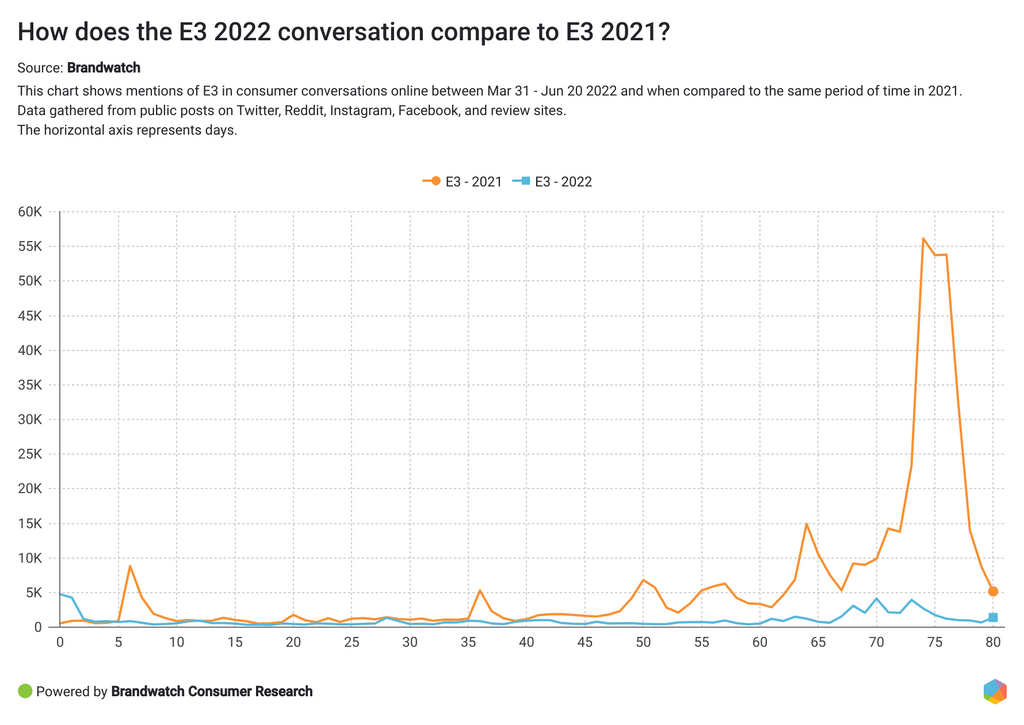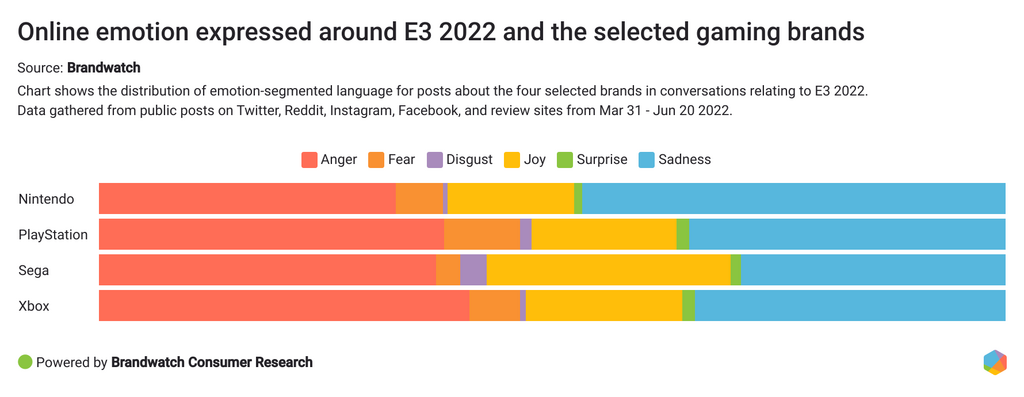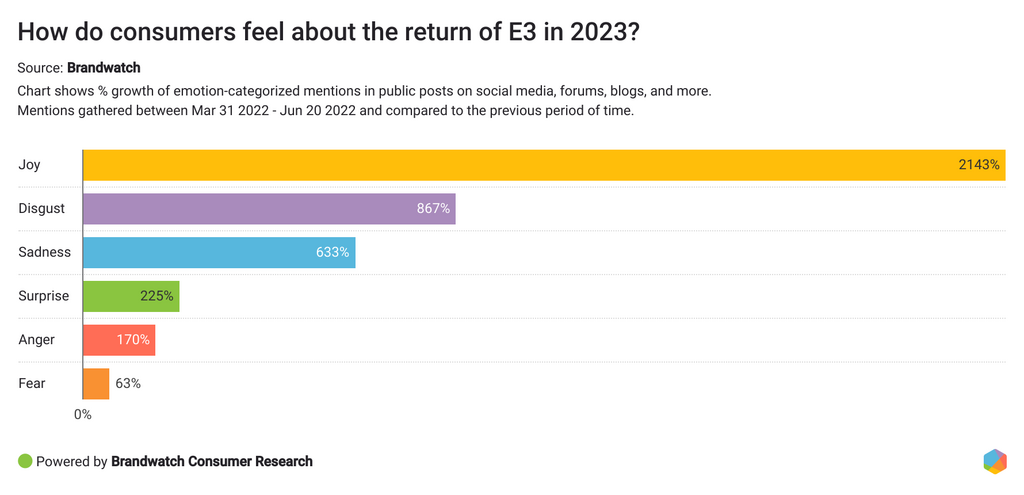Around this time of the year, one of the biggest topics in discussions relating to the gaming industry is the annual Electronic Entertainment Expo also known as E3.
And while E3 2022 has been officially canceled, the game announcements keep rolling in, with major publishers hosting their own livestreams and festivals.
We tracked general mentions around E3 between March 31 (when the official statement about the expo’s cancelation went public) and June 20 2022, to see what this year might hold for gamers and the industry at large.
In this blog post, you’ll read about:
- 2022 vs 2021: Which year drew more social mentions relating to E3
- How will the cancelation of E3 2022 impact brands in this space
- E3 2022: Top stories and brands that made the news
- How do consumers feel about the return of E3 in 2023
- Marketing takeaways for brands in the gaming industry
Let’s look at the E3 2022 in numbers first.
Social buzz: Which E3 got more social mentions?
The last in-person E3 took place in 2019, 2020 was canceled entirely, and last year’s event ran as all virtual. We gathered general mentions relating to E3 between March 31-June 20 2022 and compared this conversation to the same period of time in 2021.
As you can see on the chart, the general volume of social mentions relating to E3 was lower this year compared to the same period of time in 2021.
The topic cloud representing the conversation suggested several brands and names were top of mind for consumers.
Microsoft was one of the most frequently mentioned names in online discussions. The social conversation around the brand included people applauding the company for its impact on the industry overall, and making it easy to access the game trailers, also describing the games as “pretty drab” and “uninspiring”.
We compared the conversation around the most popular gaming brands Xbox, Nintendo, Sega, and PlayStation to see how consumers emoted in related discussions.
Nintendo generated the highest percentage of sad mentions, with some users sharing how “Nintendo’s E3 this year won’t be the same without the NYC store reactions.” Other games suggested that while the hype around Nintendo has been ultrahigh, “some people have way too high expectations for Nintendo’s E3.”
PlayStation saw gamers complain about the lack of communication from the brand, stating how, in the past, there was always a roadmap to help fans navigate the announcements and events.
Xbox saw the largest portion of angry mentions, with one of the biggest conversations spinning around “fanboyism” and “the fanboy culture” within the gaming industry. A popular gaming influencer BlackPanthaa expressed his frustration with E3 and Xbox fans in particular, describing how there’s always a group of super fans – whether it’s an in-person or virtual event – who are “loud” and “they sit in the front”, and that it’s very discouraging.
In addition to vocalizing his concerns on Twitter, in this video, the YouTuber addressed fanboyism and Xbox ambassadors, stating that an ambassadorship should be about having a friendly community and supporting one another, and insulting remarks and behavior coming from ambassadors should never be encouraged by any corporation.
In his statement, the gamer also addressed the Microsoft Gaming executive team, adding that following these ‘super fans’ on Twitter – whose behavior towards other fans is very questionable – is actually encouraging more hostility within the industry. And while “toxic super fans” are not exclusive to Xbox, the gamer pointed out how he’s mostly seen this behavior coming from Xbox fans.
Theo, the real name behind BlackPanthaa, also mentioned toxic favoritism on the PR side of things at E3. Gaming influencers are invited to join the event by brands and to create content on the games they play; yet, when gamers are trying to provide honest feedback to their fans, gaming companies don’t like it and tend not to give them preference next time (eg, getting the early access beta).
Theo’s concerns and frustration saw a lot of support among other gamers on both Twitter and YouTube.
On the brighter side, joyful mentions in conversation relating to Xbox included some users praising the brand for its recent efforts to protect content creators, as well as gamers favorably discussing Xbox Game Pass, suggesting that “there’s no better value in gaming”.
Other people declared the brand the winner of this year’s E3, even though the brand didn’t have a proper showcase.
Sega had the most joyful mentions, with some gamers celebrating one year since the release of Super Monkey Ball Banana Mania, and others reminiscing about the original Saturn, while calling for it to be remastered. But some fans weren’t particularly happy about how the brand went about the new releases, and they called it out.
How does the cancelation of E3 2022 impact brands in this space?
Some consumers worried that the E3 cancelation would be leaving their favorite brands and their announcements “up in the air”.
Users also pointed out how this year, some brands seem to choose to host their own livestreams “to get the word out there”.
‘E3’ 2022: Top stories and brands that made the news
A shift in business mindset
Consumers on Twitter reacted to the interview with Jack Tretton, the former ‘face of PlayStation’ in marketing. Jack discussed a shift in business mindset from releasing games exclusively on one platform to embracing the idea of competing for people’s time in general and against other media forms like TV, so the more exciting games consumers are getting exposed to, the better.
The Summer Game Fest is stepping in
An interview with Geoff Keighley, host and creator of the annual winter Game Awards and the Summer Game Fest, whose tweet with a single ‘😉’ six minutes after the official E3 cancelation announcement gathered over 15k likes and hundreds of highly opinionated comments, talked about the Summer Game Fest’s history and future.
Geoff has also been very vocal on social, professing his love for the industry and paying respect to the E3 conference that he’s attended every year for the last 25 years, while also promoting his brand that has now been labeled as E3’s replacement.
Xbox is sticking to its tradition
Keeping up the tradition (and despite the big cancelation news), Xbox has announced it would be holding its annual video game showcase on the same day as it usually does.
Xbox and Bethesda’s games showcase announced
Xbox and Bethesda’s announcement about the summer showcase had consumers react and engage on Twitter.
The return of E3 next year
And the biggest news of all was about the return of E3 in 2023, officially.
But are consumers actually excited about the return of E3 in 2023?
E3 2023: Yay or Nay?
We ran a search query looking for public mentions of E3 and 2023 together in conversations (news excluded) to understand how consumers feel about the return of the E3 digital and in-person conference next year.
At a first glance, the topic seemed to generate a lot of emotions in discussions.
Here’s what we found:
Some people shared that they agreed with the decision to postpone E3 to 2023 as “E3 in 2022 would have been rushed and poorly put together.”
Others discussed the high “price tag” behind the production of large expos, citing that game developer companies don’t need high-priced event spaces and that “everything else can be handled digitally.”
The show must go on: What can marketers take away from all of this?
While officially, E3 is taking a year off, the conference has been losing its popularity for some time now. But that’s not to say 2022 has nothing to show.
It seems that while, overall, gamers and other industry players were highly disappointed over the cancellation news, the industry saw a noticeable shift away from ‘putting all eggs in one basket’ and being reliant on the expo alone – and stepping up their own marketing game.
In the run-up to a major online gaming season, brands in this space need to stay alert and tuned in for more consumer insights to come. By actively monitoring consumer discussions relating to E3 and the Summer Games Fest, gaming brands can not only gauge what’s popular and not so much, but also discover consumer attitudes, penetrate intent-to-purchase discussions, and feed these insights into their business strategy.
What does the future look like for the gaming industry?
“Goodbye, middleman”: The ROI conversation
Going back to what Jack Tretton said about the shift in business mindset, more gaming studios and developers are embracing the idea that reaching more consumers easier will ultimately result in bringing in more revenue.
And streaming offers the opportunity to lower the cost of production and focus on the event itself that everyone is going to watch, as opposed to limiting a potential exposure and dipping [further] into the pocket to cover the operation costs.
Accessibility
Speaking of reaching more consumers. With the world promoting openness and inclusiveness, more and more consumers are looking for brands to create a safe environment for them to engage with one another, products and services, and to feel connected and globalized.
The gaming industry is not an exception, and marketers in this space need to take that into consideration when thinking ahead and planning for their next event.
“We need a refresh of the marketing method”
Consumers expressed their dissatisfaction with the existing promo efforts in the industry and around the new game releases. And they often didn’t hold back about how they felt, “The format was outdated before 2020”.
Many consumers described the PR efforts around E3 with phrases like “fake hype”, “lost passion”, and “biased” press coverage. And others added how they were “deeply frustrated” with a lack of communication from the organizers.
Are we done with going in person?
Not exactly. The interest in in-person events still exists, as many consumers shared that nothing can replace the value of meeting friends and networking with other creators.
While there are still some obvious benefits of going to conferences in person, one thing is clear: COVID-19 has forever changed the gaming industry. Consumer expectations around what their event experience should look like post-COVID are changing, and gaming brands and organizations in this space will have to innovate in order to retain their audience.









